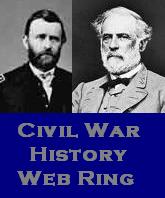
William Stretch Abert was born in Washington, D.C. on February 1, 1836. He was the son of Colonel John J. Abert, the Army’s Chief of Topographical Engineers for many years prior to the Civil War. William was commissioned directly into the army from civilian life as a second lieutenant in the 4th Artillery on June 18, 1855.
William Abert was a well-traveled individual as he accompanied his unit during its assignments in the years preceding the Civil War. He served at Fort Ontario, New York until October, 1856, when he accompanied his company to Florida. He was promoted to first lieutenant on March 31, 1857, and continued to serve in Florida until September. He participated in the Utah expedition with his company March 1858 to April 1859. Abert served training recruits at Governor’s Island, New York harbor until June 1859. His company was stationed at Fort Randall, Nebraska until April 1860, when they moved to Fort Monroe, Virginia. Abert remained there until April, 1861, when he was placed on detached service under orders of General Scott.
He was promoted to captain in the newly-organized 3rd US Cavalry on May 14, 1861, re-designated as the 6th US Cavalry on August 3, 1861. He joined regiment at Poolesvile, Maryland later that month, and assumed command of Company D on September 9, 1861. He served with the regiment through its initial training and the opening battles of the Peninsula Campaign. He commanded a squadron at the battles of Williamsburg and Hanover Court House, and received a brevet promotion to major on May 27, 1862 for gallant and meritorious service during the latter battle.
Captain Abert was detailed to serve as an aide-de-camp to Major General George McClellan in July, 1862. He continued to serve in this position until McClellan was relieved from command of the Army of the Potomac on November 7, 1862. He received a brevet of lieutenant colonel for gallant and meritorious service as an aide during the battle of Antietam, and was commended by McClellan after he was relieved for the quality of his service.
After McClellan was relieved, Abert was assigned to the staff of Major General Nathaniel Banks as his Assistant Inspector General, with the rank of lieutenant colonel. He held this position from November 17, 1862 to October 6, 1864, serving primarily in New Orleans, Louisiana with the Department of the Gulf.
On December 3, 1864, he was promoted to colonel of volunteers and assigned command of the 3rd Massachusetts Volunteer Heavy Artillery regiment. He commanded his regiment in the defenses of Washington for the remainder of the war, and was mustered out of volunteer service with his regiment on September 18, 1865.
Although he received a brevet promotion to brigadier general of volunteers for gallant and meritorious service during the war on March 13, 1865, Abert reverted to his rank in the regular army at the war’s end. He rejoined the 6th US Cavalry in Texas when the 3rd Massachusetts Artillery was mustered out. He served with the regiment in Texas until February, 1867, when he was assigned as the Assistant Inspector General, Department of Texas. He held that position until August.
Abert was promoted to major in the 7th US Cavalry in June 1867 following that regiment’s disaster at Little Big Horn, but held the position only two months. William S. Abert died of yellow fever in Galveston, Texas on August 25, 1867 at the age of 31. He is buried in Rock Creek Cemetery, Washington, D.C.


2 comments:
How did the Little Big Horn (1876) affect him in 1867?
Doh! Mike, you're absolutely right, I stand corrected. I must have transposed 67 and 76 in my head when I looked at it and checked the months. Good catch!
Post a Comment